-
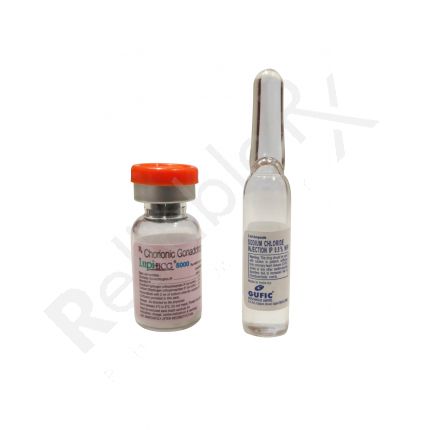 LupiHCG 5000 i.u.US$ 15.58 - US$ 15.59
LupiHCG 5000 i.u.US$ 15.58 - US$ 15.59US$ 15.58
US$ 15.58
Generic For : NovarelActive Ingredients : HCG (Human Chorionic Gonadotropin)1 VialsUS$ 15.58 US$ 17.32 -
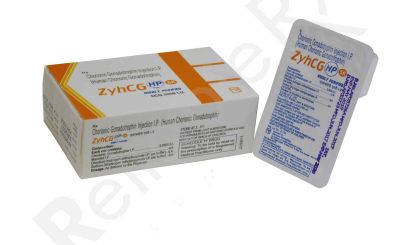 ZyHCG HP 5000 i.uUS$ 15.84
ZyHCG HP 5000 i.uUS$ 15.84US$ 15.84
US$ 15.84
Generic For : NovarelActive Ingredients : HCG (Human Chorionic Gonadotropin)1 VialsUS$ 15.84 US$ 17.60 -
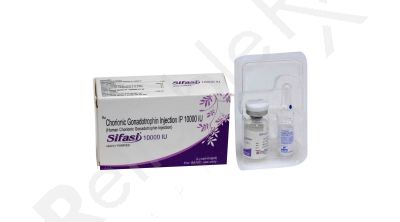 Sifasi-HP (Highly Purified) 10000 i.u.US$ 21.51 - US$ 28.68
Sifasi-HP (Highly Purified) 10000 i.u.US$ 21.51 - US$ 28.68US$ 21.51
Generic For : NovarelActive Ingredients : HCG (Human Chorionic Gonadotropin)1 Vial/sUS$ 28.68 -
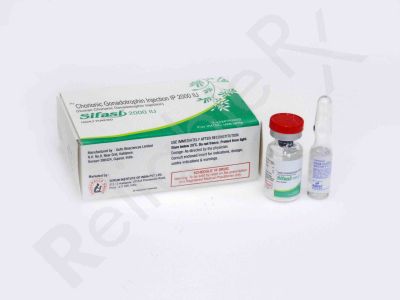 Sifasi-HP (Highly Purified) 2000 i.u.US$ 13.96 - US$ 13.97
Sifasi-HP (Highly Purified) 2000 i.u.US$ 13.96 - US$ 13.97US$ 13.96
US$ 13.96
Generic For : NovarelActive Ingredients : HCG (Human Chorionic Gonadotropin)1 Vial/sUS$ 13.96 US$ 17.46 -
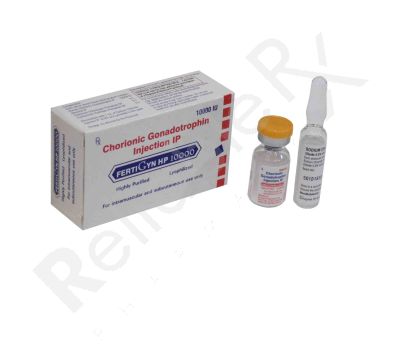 Fertigyn HP 10000 i.u.US$ 26.19 - US$ 28.69
Fertigyn HP 10000 i.u.US$ 26.19 - US$ 28.69US$ 26.19
US$ 26.19
Generic For : NovarelActive Ingredients : HCG (Human Chorionic Gonadotropin)1 Ampoule/sUS$ 28.68 US$ 31.87 -
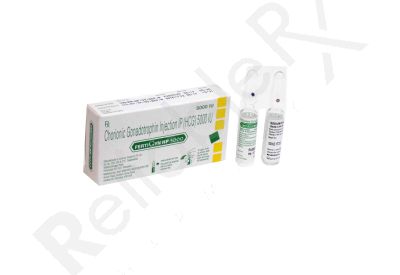 Fertigyn HP 5000 i.u.US$ 17.46 - US$ 18.71
Fertigyn HP 5000 i.u.US$ 17.46 - US$ 18.71US$ 17.46
US$ 17.46
Generic For : NovarelActive Ingredients : HCG (Human Chorionic Gonadotropin)1 Ampoule/sUS$ 18.71 US$ 20.79 -
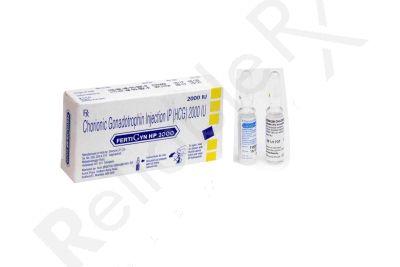 Fertigyn HP 2000 i.u.US$ 13.96 - US$ 13.97
Fertigyn HP 2000 i.u.US$ 13.96 - US$ 13.97US$ 13.96
US$ 13.96
Generic For : NovarelActive Ingredients : HCG (Human Chorionic Gonadotropin)1 Ampoule/sUS$ 13.96 US$ 17.46 -
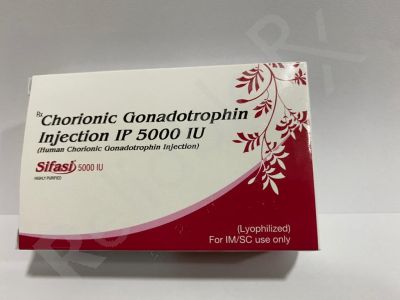 Sifasi 5000 i.u. (Highly Purified)US$ 13.96 - US$ 13.97Generic For : NovarelActive Ingredients : HCG (Human Chorionic Gonadotropin)Sold Out
Sifasi 5000 i.u. (Highly Purified)US$ 13.96 - US$ 13.97Generic For : NovarelActive Ingredients : HCG (Human Chorionic Gonadotropin)Sold Out -
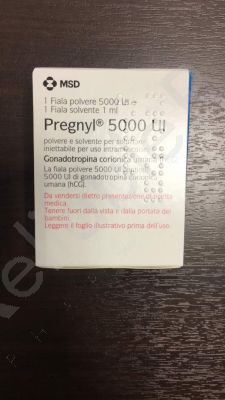
-
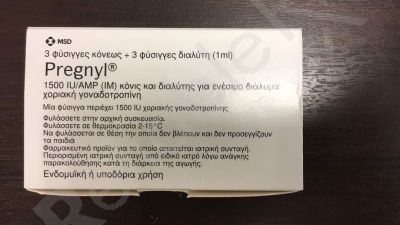
-
 Foligraf 150 IUUS$ 13.96 - US$ 13.97Generic For : Follistim AQActive Ingredients : Recombinat HumanSold Out
Foligraf 150 IUUS$ 13.96 - US$ 13.97Generic For : Follistim AQActive Ingredients : Recombinat HumanSold Out -
 Foligraf 75 IUUS$ 13.96 - US$ 13.97Generic For : Follistim AQActive Ingredients : Recombinat HumanSold Out
Foligraf 75 IUUS$ 13.96 - US$ 13.97Generic For : Follistim AQActive Ingredients : Recombinat HumanSold Out -
 Ovunal SC 10000 i.u.US$ 13.96 - US$ 13.97Generic For : NovarelActive Ingredients : HCG (Human Chorionic Gonadotropin)Sold Out
Ovunal SC 10000 i.u.US$ 13.96 - US$ 13.97Generic For : NovarelActive Ingredients : HCG (Human Chorionic Gonadotropin)Sold Out -
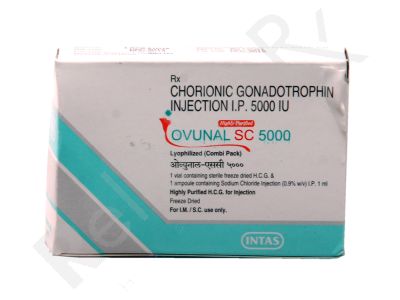 Ovunal SC 5000 i.u.US$ 13.96 - US$ 13.97Generic For : NovarelActive Ingredients : HCG (Human Chorionic Gonadotropin)Sold Out
Ovunal SC 5000 i.u.US$ 13.96 - US$ 13.97Generic For : NovarelActive Ingredients : HCG (Human Chorionic Gonadotropin)Sold Out -
 Ovunal SC 2000 i.u.US$ 13.96 - US$ 13.97Generic For : NovarelActive Ingredients : HCG (Human Chorionic Gonadotropin)Sold Out
Ovunal SC 2000 i.u.US$ 13.96 - US$ 13.97Generic For : NovarelActive Ingredients : HCG (Human Chorionic Gonadotropin)Sold Out -
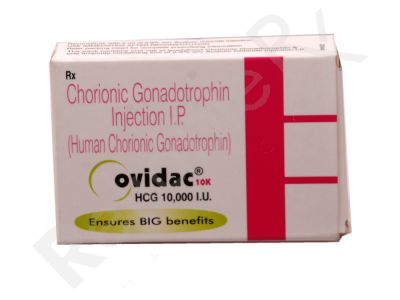 Ovidac 10000 i.u.US$ 13.96 - US$ 13.97Generic For : NovarelActive Ingredients : HCG (Human Chorionic Gonadotropin)Sold Out
Ovidac 10000 i.u.US$ 13.96 - US$ 13.97Generic For : NovarelActive Ingredients : HCG (Human Chorionic Gonadotropin)Sold Out -
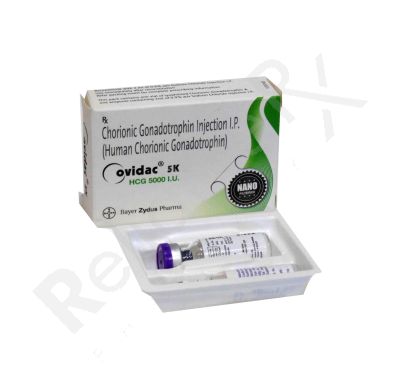 Ovidac 5000 i.u.US$ 13.96 - US$ 13.97Generic For : NovarelActive Ingredients : HCG (Human Chorionic Gonadotropin)Sold Out
Ovidac 5000 i.u.US$ 13.96 - US$ 13.97Generic For : NovarelActive Ingredients : HCG (Human Chorionic Gonadotropin)Sold Out -
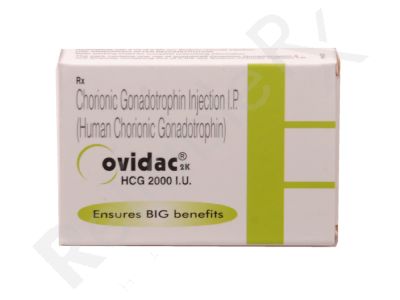 Ovidac 2000 i.u.US$ 13.96 - US$ 13.97Generic For : NovarelActive Ingredients : HCG (Human Chorionic Gonadotropin)Sold Out
Ovidac 2000 i.u.US$ 13.96 - US$ 13.97Generic For : NovarelActive Ingredients : HCG (Human Chorionic Gonadotropin)Sold Out -
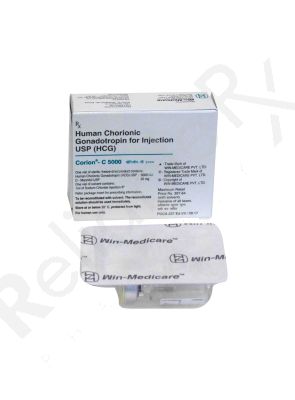 Corion C 5000 i.u.US$ 13.96 - US$ 13.97Generic For : NovarelActive Ingredients : HCG (Human Chorionic Gonadotropin)Sold Out
Corion C 5000 i.u.US$ 13.96 - US$ 13.97Generic For : NovarelActive Ingredients : HCG (Human Chorionic Gonadotropin)Sold Out -
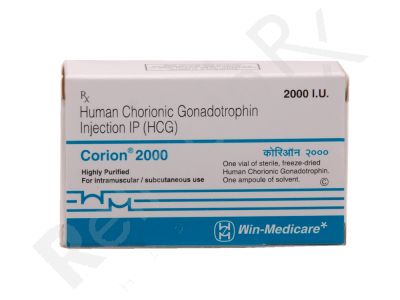 Corion 2000 i.u.US$ 13.96 - US$ 13.97Generic For : NovarelActive Ingredients : HCG (Human Chorionic Gonadotropin)Sold Out
Corion 2000 i.u.US$ 13.96 - US$ 13.97Generic For : NovarelActive Ingredients : HCG (Human Chorionic Gonadotropin)Sold Out
Overview
“ Pregnancy is God’s gift to a woman as she has the absolute power to create life” It’s a unique and wonderful experience for both parents. Any problem in getting pregnant can really cause the couple to face serious conditions like low self-esteem, marital problems, and depression. Infertility has serious implications for the mental and social health of a couple. Infertility is a condition in which a woman is unable to produce offspring. In this, a lady fails to conceive after trying for more than a year. To get pregnant, a woman’s body must release an egg from the ovaries and it travels through the fallopian tube toward the womb. Man’s sperm gets fused with the egg and the fertilized egg must attach to the inside of the uterus. This is the whole process of conception. When a woman conceives, she carries the pregnancy to full term. Any obstruction in any of these steps can cause infertility. Infertility can’t be restricted to females only men can be impotent or infertile.
What are the types of infertility?
Infertility can be of many types, some of them are:
- Primary infertility – It occurs when a woman fails to become pregnant after trying for more than 12 weeks
- Secondary infertility – It arises in the couple who encounters no problem in conceiving the first child but fails to conceive for the second time
- Sub fertility- There are couples who are unable to conceive a child together but can produce offspring with other people
What are the causes of infertility?
Infertility in men can occur due to genetic defects such as DNA damage and other infections like mumps and varicocele. Premature and retrograde ejaculation and some medications like steroids or narcotic analgesics can cause problems in the release of sperm.
Infertility in women can occur due to hormonal disorders like polycystic ovary syndrome and other uterine or cervical disorders. Any blockage in fallopian tubes doesn’t allow the joining of sperm and ovum thus obstructing the fertilization process.
What are the risk factors for infertility?
There are certain risk factors that contribute to this condition are as follows:
- With an increase in age, there is a decrease in the women’s fertility. Women after the age of 35 and men after the age of 50 are less fertile
- Smoking is one of the main reasons that can lead to infertility
- Obesity or overweight is one of the main reasons that causes hormonal changes in the body that avoid pregnancy
- Consumption of alcohol can decrease the sperm count and can cause miscarriages
- Stress can really affect the ovulation and production of sperm. Increased levels of stress directly affect the reproductive state
- Disease conditions like hypothyroidism and polycystic ovary syndrome increase the chances of infertility
- Exposure to certain chemicals like pesticides, and herbicides can cause infertility problems
When should a couple seek help?
After trying for more than one year, when a couple fails to achieve conception then there is a need to consult a gynecologist or fertility specialist. There are certain conditions in which there is a need to seek help such as:
- Women encountering irregular or missed cycles
- Women who are above the age of 35 years
- Women who have tubal disorders or other pelvic infections
- Men who have abnormal semen analysis
- Men who have erectile or ejaculatory dysfunctions
What are the diagnostic measures?
Diagnosing the underlying problem is the most important factor in determining the root cause of infertility. The fertility of a woman is tested by the gynecologist and various tests are done such as
- Test of ovulation – hormonal level of the body are dually checked to evaluate whether you are ovulating or not.
- Examination of fallopian tubes and uterus – X-ray image of uterus and fallopian tube is taken in order to see any obstruction or other associated problem
- Ovarian reserve test- in this, the capacity of fertilization is evaluated by observing the potency of eggs.
- Other hormone levels- Thyroid and Pituitary hormone levels are analyzed as they have a major role in regulating reproductive hormones
In the case of Men, the following tests are done such as:
- Analysis of semen – in this semen sample is given in the lab and pathologist analyses the potency of semen fluid
- Hormonal test- Reproductive hormone levels are tested in order to assess fertility
- Hypo-osmotic swelling test – It is done to see the outer layer of the sperm and whether it is broken or intact
What are the treatment options available?
Treatment of infertility is a complex blend of drugs and surgeries. There are various treatment options available like medication, reproductive therapy, artificial insemination, or assisted reproductive technology.
Medication therapy is used to correct the irregular cycle of menstrual periods. The first line of treatment is oral medication if the basic cause is not related to ovulation problems. These drugs produce a regular menstrual cycle. Another medical remedy is Gonadotropin therapy which helps in inducing ovulation. This is injected every day for almost one week and along with this close monitoring is done by taking blood tests and ultrasounds
Some oral medications are as follows:
- Clomiphene citrate is an oral medicine used in ovulation problems associated with the pituitary gland i.e. a master gland of the body. It is given in the women who have polycystic ovary syndrome
- Follicle-stimulating hormone analogs are injected in order to stimulate the process of ovulation
- Metformin is the anti-diabetic drug that lowers the level of male hormones in the women’s body having polycystic syndrome. This drug helps in ovulation
- Bromocriptine is a drug given to treat ovulation problems related to high levels of prolactin in the body
If oral medications fail to cause conception, then couples have other techniques such as:
- Artificial insemination
- Reproductive surgeries
- Assisted reproductive technologies
For the treatment of male infertility, drugs are given in case of erectile dysfunction or retrograde ejaculation. Surgical procedures are also adopted such as:
- Microsurgical vasectomy reversal
- Microsurgical correction of obstruction in the epididymis
- Microsurgical varicocele ligation
Also read: HCG Vaccines: The best way to Deal with Infertility in Women
What’s the first-line treatment for infertility?
Oral medicines are usually the first-line treatment if you have been diagnosed with infertility. These medications are made in a way that they help to increase the likelihood of conception and pregnancy.
What are the commonly used fertility medications?
Clomid is the most commonly used fertility medication. Clomid or clomiphene citrate is often the first medicine tried when treating ovulatory dysfunction. It may also be prescribed in the early stages of treatment for couples diagnosed with unexplained infertility.
What are the treatment options for infertility?
With intrauterine insemination (IUI), a woman takes medicines to stimulate ovulation, and sperm are inserted into her uterus.
Assisted reproductive technology (ART) is an advanced technology; the most well-known ART is in vitro fertilization (IVF).
What are the concerns while using fertility medications?
Depending on what type of fertility treatment you use, there is a risk of bleeding and infection, and you may develop ovarian hyperstimulation syndrome (OHSS). This is when the medicines used in fertility treatments can cause pain in your ovaries. OHSS can contribute to nausea and bloating.
What is the best time to take fertility medications?
You usually take the first tablet on the third, fourth, or fifth day after you begin your period. You may begin to ovulate about seven days after you have taken the last dose. If it doesn’t occur right away, your doctor may ask you to increase your dose by 50 mg per day each month, up to 150mg.
How long does fertility medication stay in your body?
If you are undergoing fertility therapy that includes HCG shots, you might have high levels for several days after receiving the shot. Usually, it takes about ten days for the injected HCG shot to get clear out of the body.
How long does it take for fertility medication to work?
It is started on day two of the menstrual cycle (day 1 is the day you bleed), and initially, a 50 mg tablet is taken once daily for five days. Ovulation usually happens 5 to 12 days after the last Clomid tablet.
How successful are fertility medicines?
The success of fertility medicines is about 50%, which means half of the couples who receive fertility end up conceiving. However, the success of treatment varies from one person to another.
Which online site is best for fertility medicine?
Buy fertility medicine from the trusted online pharmacy Reliablerxpharmacy.com, which offers authentic medicines at the best prices.
How do I get prescription fertility medicine online?
You may consult a fertility specialist who may prescribe appropriate fertility treatment for your condition. Once you get the doctor’s prescription, you can order them online from a reliable platform.





20% OFF
On New Registration
Terms and Conditions Apply*
Flat 20% OFF
on your first purchase
20% off only on the product value
Maximum discount value $20
Only one coupon can be used at a time
Coupon code will be mailed on
your registered email address.
Login
Sign up
Flat 20% OFF
on your first purchase
20% off only on the product value
Maximum discount value $20
Only one coupon can be used at a time
Coupon code will be mailed on
your registered email address.
Login
Sign Up
Flat 20% OFF
on your first purchase
20% off only on the product value
Maximum discount value $20
Only one coupon can be used at a time
Coupon code will be mailed on
your registered email address.
Forgot Password ?